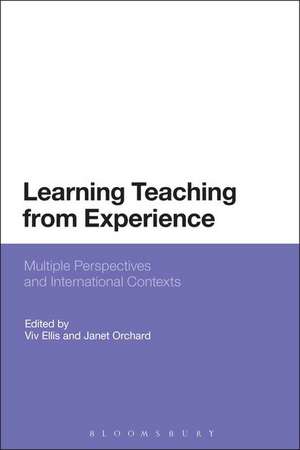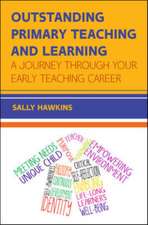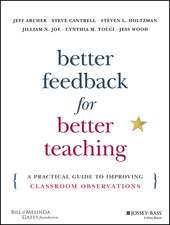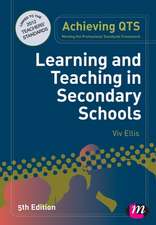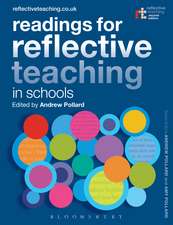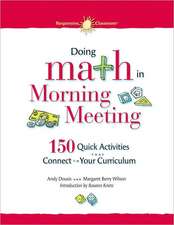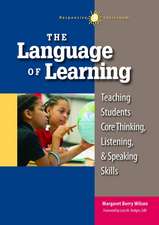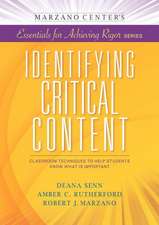Learning Teaching from Experience: Multiple Perspectives and International Contexts
Editat de Professor Viv Ellis, Dr Janet Orcharden Limba Engleză Paperback – 29 iul 2015
| Toate formatele și edițiile | Preț | Express |
|---|---|---|
| Paperback (1) | 258.42 lei 6-8 săpt. | |
| Bloomsbury Publishing – 29 iul 2015 | 258.42 lei 6-8 săpt. | |
| Hardback (1) | 774.62 lei 6-8 săpt. | |
| Bloomsbury Publishing – 15 ian 2014 | 774.62 lei 6-8 săpt. |
Preț: 258.42 lei
Preț vechi: 295.87 lei
-13% Nou
Puncte Express: 388
Preț estimativ în valută:
49.45€ • 51.53$ • 40.94£
49.45€ • 51.53$ • 40.94£
Carte tipărită la comandă
Livrare economică 03-17 aprilie
Preluare comenzi: 021 569.72.76
Specificații
ISBN-13: 9781474248235
ISBN-10: 1474248233
Pagini: 288
Dimensiuni: 156 x 234 x 15 mm
Greutate: 0.41 kg
Editura: Bloomsbury Publishing
Colecția Bloomsbury Academic
Locul publicării:London, United Kingdom
ISBN-10: 1474248233
Pagini: 288
Dimensiuni: 156 x 234 x 15 mm
Greutate: 0.41 kg
Editura: Bloomsbury Publishing
Colecția Bloomsbury Academic
Locul publicării:London, United Kingdom
Caracteristici
Explores questions of learning from experience, with particular reference to teaching and teacher education
Notă biografică
Viv Ellis is Professor and Dean of the Faculty of Education at Monash University, Australia.Janet Orchard is a Senior Teaching Fellow in the Graduate School of Education at the University of Bristol, UK.
Cuprins
List of Figures and TablesContributorsAcknowledgements1. Learning to Teach 'From Experience': Towards a Genealogy of the Ideas, Viv Ellis (Brunel University, UK) and Janet Orchard (University of Bristol, UK)Part I: Multiple Perspectives on Learning Teaching from Experience2. Acculturation or Innovation in Experiential Learning? Pedagogical Practices of Teachers on an Alternative Certification Programme, Daniel Muijs (University of Southampton, UK)3. Learning from Experience in Teaching: A Cultural Historical Critique, Anne Edwards (University of Oxford, UK)4. The Rhetorics of Experience and 'The Importance of Teaching', Tom Are Trippestad (Bergen University College, Norway)5. Learning from Experience: A Teacher-Identity Perspective, Brad Olsen (University of California, Santa Cruz, USA)6. Teachers' Storied Experiences: Rules or Tools for Action?, Eli Ottesen (University of Oslo, Norway)7. Already at Work in the World: Fictions of Experience in the Education of Teachers, Madeleine Grumet (University of North Carolina, USA)Part II: Perspectives in International Contexts8. The Authority of Experience, Deficit Discourse and Teach for America: The Risks for Urban Education, Heidi Pitzer (Syracuse University, USA)9. Restoring Higher Education's Mission in Teacher Education: A Global Challenge from a Canadian Perspective, Elizabeth Sloat (University of New Brunswick, Canada), Ann Sherman (University of New Brunswick, Canada), Theodore Christou (Queen's University, Canada), Mark Hirschkorn (University of New Brunswick, Canada), Paula Kristmanson (University of New Brunswick, Canada), Lynn Lemisko (University of Saskatchewan, Canada) and Alan Sears (University of New Brunswick)10. Experience as a Contextual Basis to Connect Professional Concerns and Conditions of Practice: A Case Study of Teachers Implementing a Curricular Reform in Italy, Paolo Sorzio (University of Trieste, Italy)11. Learning from Experience as Continual Processes of Design: A Norwegian Case Study, Anne Line Wittek (Vestfold University College, Norway)12. Vertical Integration as a Mode of Production: Teachers' Resistance to the Business of Teaching, Torie Weiston-Serdan (Claremont Graduate University, USA) and Sheri-Dorn Giarmoleo (The Los Angeles Public Schools, USA) Part III: The Experience of Learning to Teach English, Maths and Science13. Negotiating Conflicting Frames of Experience: Learning to Teach in an Urban Teacher Residency, Lauren Gatti (University of Nebraska, USA)14. Developing Knowledge for Teaching from Experience: Mathematics Teaching and Professional Development in the United States of America, Erik Jacobson (University of Georgia, USA)15. Creating a Shared Pedagogical Language: Interpreting How Teacher Candidates Learn from Experiences in a Science Methods Course, Shawn Bullock (Simon Fraser University, Canada)Afterword: Teacher Education and the Politics of Experience, Ken Zeichner (University of Washington, USA)Part IV: Afterword16. The Politics of Learning to Teach from Experience, Ken Zeichner (University of Washington, USA)Index
Recenzii
This book unpacks fundamental issues of teacher identity, practice and development and, in doing so, helps to define what professionalism means for educators ... Very timely - and therefore politically aware.
An important, timely and challenging book; an essential resource for everyone interested in the future of teacher education.
At last, a book which combines a breadth of cross-disciplinary education scholarship, a breadth of focus - across North America and Europe - and accounts of practice in a range of contexts. This is book goes beyond factional rhetoric while demonstrating passionate commitment to the education of our young people. It addresses the deepest questions of education for what purposes, for whom, how, and in what conditions teachers learn from their experiences. Read the book to understand the complexities underlying that widely used phrase 'learn from experience'. Fascinating and enlightening.
This book should be required reading for courses of teacher education, particularly in the current context in which 'learning on the job' and the craft idea of a teacher is increasingly the norm. In this context, the rhetoric of 'learning from experience' is frequently invoked. But what does it mean to learn from experience? Is understanding theory not experiential? The contributions in the book approach these questions with a wealth of research and applied knowledge, which at times challenge orthodoxy on learning theories and policy. The diversity of approaches, as well as the detail and exemplification they give provide a highly informative account of aspects of learning from experience from multiple perspectives, and give us pause for thought that there can be 'a science of education', a formulaic application of research data and policy borrowing. The book's chapters invite us to think carefully about the best way to develop teachers. It provides a rich account of why 'formation' is required, not some kind of technical 'training'.
An important, timely and challenging book; an essential resource for everyone interested in the future of teacher education.
At last, a book which combines a breadth of cross-disciplinary education scholarship, a breadth of focus - across North America and Europe - and accounts of practice in a range of contexts. This is book goes beyond factional rhetoric while demonstrating passionate commitment to the education of our young people. It addresses the deepest questions of education for what purposes, for whom, how, and in what conditions teachers learn from their experiences. Read the book to understand the complexities underlying that widely used phrase 'learn from experience'. Fascinating and enlightening.
This book should be required reading for courses of teacher education, particularly in the current context in which 'learning on the job' and the craft idea of a teacher is increasingly the norm. In this context, the rhetoric of 'learning from experience' is frequently invoked. But what does it mean to learn from experience? Is understanding theory not experiential? The contributions in the book approach these questions with a wealth of research and applied knowledge, which at times challenge orthodoxy on learning theories and policy. The diversity of approaches, as well as the detail and exemplification they give provide a highly informative account of aspects of learning from experience from multiple perspectives, and give us pause for thought that there can be 'a science of education', a formulaic application of research data and policy borrowing. The book's chapters invite us to think carefully about the best way to develop teachers. It provides a rich account of why 'formation' is required, not some kind of technical 'training'.
